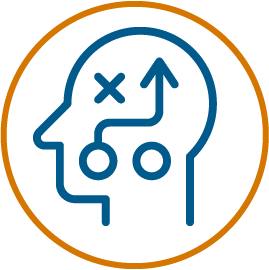Become an expert in managing conflict, facilitating peaceful problem solving, and fostering collaborative decision-making.
Program Type
Graduate Certificate
Semester Start
Fall, Spring
Study Options
Online, On Campus, Hybrid
Minimum Duration
9 months
UMass Boston's 12-credit Conflict Resolution graduate certificate program provides professionals with training to manage conflict in a variety of settings. The program is designed for professionals who want to develop knowledge of conflict management techniques and add a professional certificate to their résumé. Students will focus on a range of approaches to the resolution of conflict, collaborative decision making, and problem solving through courses that encompass the theory, methods, and ethical perspectives of conflict resolution.
You can also apply for and transfer the 12 credits towards the 36-credit Master's degree in Conflict Resolution.
Tuition
- This program consists of four 3-credit courses, or 12 credits.
- Online tuition is $575 per credit, or $6,900 for 12 credits.
- Other fees may apply. Request Info to connect with a program representative for further details about curriculum.
Deadlines
- Applications to start classes in the fall semester are due by June 1
- Applications to start classes in the spring semester are due by November 1
Application Checklist
- Online application and fee ($75)
- Official transcripts (completed Bachelor’s degree required)
- International applicants* may have to satisfy the English proficiency requirement. Review International Graduate Applicant page to research testing and exemption requirements.
- Résumé
- 2 letters of recommendation
- Statement of Purpose — Please supply one document including the answer to each of the following 2 questions. Be sure to answer each question.
- Describe one or more specific experiences you have had with conflict. What was your role? What were your rewards and frustrations? (500-750 words)
- How will you apply the skills, knowledge, and perspective acquired through the program in your current and/or future employment? (500-750 words)
*Please note the certificate does not meet eligibility requirements for issuance of an I-20.
The program consists of four (3 credit) courses totaling 12 credits and can be completed in 2 semesters (2 courses per semester). Each semester, you'll take one required course and the elective offered for that particular semester.
Required Courses (2 — one offered each semester, Fall and Spring)
- Introductory Theory (CONRES623)
This course examines the theories and assumptions underpinning the practice of negotiation and mediation. It identifies the major schools of thought that influence models in practice and shape research agendas. It examines theories critically, with three aims-uncovering implicit assumptions of practice, testing those assumptions against empirical evidence or other theories, and gleaning insights to assist practitioners. - Negotiation (CONRES621)
Negotiation is the bedrock skill in this field. This course addresses the development of negotiation techniques and fosters student knowledge of the substantial body of negotiation theory that is now available.
Electives (2 — one offered each semester, Fall and Spring; topics vary by semester — below is a sample of what may be offered)
Sample Electives:
- Third Party Interventions
Study a range of third-party interventions, from arbitration and ombuds work to mediation, dialogue, and circle processes, among others. Explore the underlying logic and theories of change beneath the various third-party interventions, as well as foundational questions of neutrality and positionality, and develop cross-cutting skills like conflict analysis, effective communication, and evaluation. Learn how various interventions work in practice, and explore cases, hear directly from practitioners, and practice through exercises and simulations in order to understand the strengths and drawbacks of different interventions for various contexts and types of conflict. - Nonviolent Action
In this online course, you will get an introduction to the foundational concepts and theories of nonviolent action, explore the research on its effectiveness, study cases from the United States and around the world of how it has worked even in very challenging or repressive contexts, and introduce tools to analyze and plan a campaign relying on nonviolent action to address an injustice or threat. - Cross-Cultural Conflict (CONRES625)
This course emphasizes the special characteristics of conflict based in religious, ethnic, national, or racial identity-conflicts that the field calls ''intractable.'' The primary focus of the course is on intervention techniques that have been used and that have been proposed for use in these settings. - Collaborative Governance
Actors in local, state, and federal governments must find ways to work collaboratively, manage conflicts, and build consensus on ways to address complex social programs with other public actors as well as with private and nonprofit organizations, citizen groups, and other stakeholders. This is often a challenging task, particularly when dealing with high conflict, competition, and distrust between stakeholders, and when practiced poorly can impede rather than promote effective action. On the other hand, collaboration can be vital to creating and implementing sustainable, successful policies.
At the end of this two-semester program, you’ll be awarded a graduate certificate in Conflict Resolution. The certificate will demonstrate your expertise in the field on your résumé, as well as in interviews and workplace evaluations. You can also apply for and transfer the 12 credits towards the 36 credit Master's degree in Conflict Resolution.
This certificate provides the theoretical foundations and practical skills to advance your current career trajectory or help you transition to a new one. You will gain a thorough grounding in the theory of conflict and its resolution. Through the program, you'll explore the social, psychological, political, structural, and cultural factors which give rise to conflict and shape its course, and gain an understanding of the effects of different types of conflict on people and the relationships among them. You will learn about conflict management and resolution methods relevant to a broad range of contexts and groups, including mediation, facilitation, negotiation, organizational change, and consensual decision making.
Alumni work in many fields, including business; government; education; health care; human resources; law; ministry; international humanitarian work; and individual, couples, and family counseling.
Why UMass Boston Online?
Value
Among the lowest online tuition rates of an accredited, public research university.
Flexibility
Study full-time to finish fast, or part-time to suit your schedule. Live sessions scheduled with the working professional in mind.
Authenticity
The same courses taught by the same academic departments as on campus. No third-party providers.
Learn More






